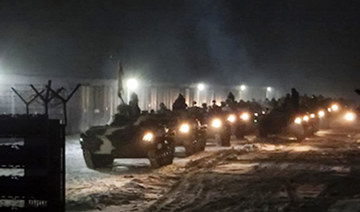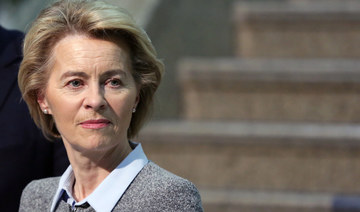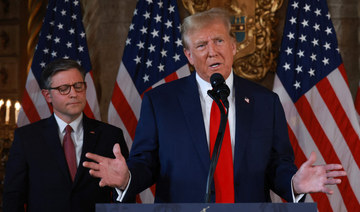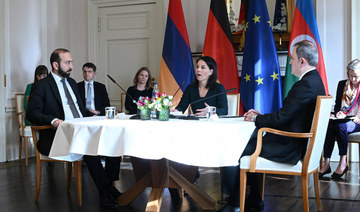MOSCOW: Russia’s top diplomat said Friday that Moscow will not start a war in Ukraine but warned that it wouldn’t allow the West to trample on its security interests, amid fears it is planning to invade its neighbor.
US President Joe Biden warned Ukraine’s leader a day earlier that there is a “distinct possibility” that Russia could take military action against the former Soviet state in February.
“There won’t be a war as far as it depends on the Russian Federation, we don’t want a war,” Foreign Minister Sergey Lavrov said in a live interview with Russian radio stations. “But we won’t let our interests be rudely trampled on and ignored.”
Tensions have soared in recent weeks, and the United States and its NATO allies warily eyed a buildup of more than 100,000 Russian troops near Ukraine, worrying that Moscow was preparing to attack. Russia has repeatedly denied having any such plans, but has demanded that NATO promise Ukraine will never be allowed to join and that the alliance roll back deployments of troops and military equipment in Eastern Europe.
The US and NATO formally rejected those demands this week, though Washington outlined areas where discussions are possible, offering hope that there could be a way to avoid war.
Russia’s official response to those proposals will come from President Vladimir Putin, but the Kremlin has said there was “little ground for optimism.”
Lavrov echoed noted that grim note Friday.
“While they say they won’t change their positions, we won’t change ours,” he said. “I don’t see any room for compromise here.”
Putin opened the weekly meeting of his Security Council on Friday, saying only that it would address foreign policy issues. Kremlin spokesman Dmitry Peskov said that the Russian leader may also discuss his reaction to the US rejection with French President Emmanuel Macron during their video call the same day.
Lavrov noted that the US suggested the two sides could talk about limits on the deployment of intermediate-range missiles, restrictions on military drills and rules to prevent accidents between warships and aircraft. He said that Russia proposed discussing those issues years ago — but Washington and its allies never took them up on it until now.
While he described the US offers as reasonable, he emphasized that Russia’s main concerns are to stop both NATO’s expansion and the deployment of the alliance weapons near Russia’s borders. He noted that international agreements say that the security of one nation must not come at the expense of others’ — and that he would send letters to ask his Western counterparts to address that obligation.
“It will be hard for them to wiggle out from answering why they aren’t fulfilling the obligations sealed by their leaders not to strengthen their security at the expense of others,” he said.
As tensions build, Washington warned Moscow of devastating sanctions if it invades Ukraine, including penalties targeting top Russian officials and key economic sectors. Several senior US officials also said Thursday that Germany would not allow a newly constructed pipeline — which is meant to bring gas directly from Russia — to begin operations if Russia invades Ukraine.
Asked about possible sanctions, Lavrov said that Moscow had warned Washington that their introduction would amount to a complete severing of ties.
While Moscow and the West are mulling their next steps, NATO said it was bolstering its deterrence in the Baltic Sea region, and the US ordered 8,500 troops on higher alert for potential deployment to Europe.
Russia has launched a series of military drills involving motorized infantry and artillery units in southwestern Russia, warplanes in Kaliningrad on the Baltic Sea, and dozens of warships in the Black Sea and the Arctic. Russian troops have also headed to Belarus for sweeping joint drills, raising Western fears that Moscow could stage an attack on Ukraine from the north. The Ukrainian capital is just 75 kilometers (50 miles) from the border with Belarus.
Despite the alarming rhetoric, Ukrainian officials have repeatedly tried to project calm.
Ukraine’s Defense Minister Oleksii Reznikov told parliament Friday that the total number of Russian troops near Ukraine — about 130,000 — is comparable to Moscow’s military buildup in the spring of 2021, when Moscow eventually pulled its forces back after massive military exercises.
“We haven’t observed any events or actions of military character that significantly differ from what was going on last spring,” with the exception of the deployment to Belarus, Reznikov said.
But that has so far not reassured many in the West. Biden warned Ukrainian President Volodymyr Zelenskyy in Thursday’s call that the US believed there was a high degree of likelihood that Russia could invade when the ground freezes and Russian forces could attack Ukrainian territory from north of Kyiv, according to two people familiar with the conversation who were not authorized to comment publicly.
While concerns rise about an invasion, Ukraine is already beset by conflict. Following the 2014 ouster of a Kremlin-friendly president in Kyiv, Moscow annexed Ukraine’s Crimean Peninsula and backed an insurgency in the country’s eastern industrial heartland. Fighting between Ukrainian forces and Russia-backed rebels has killed over 14,000 people, and efforts to reach a settlement have stalled.
Russia says it won’t start a war as Ukraine tensions mount
https://arab.news/vcftt
Russia says it won’t start a war as Ukraine tensions mount
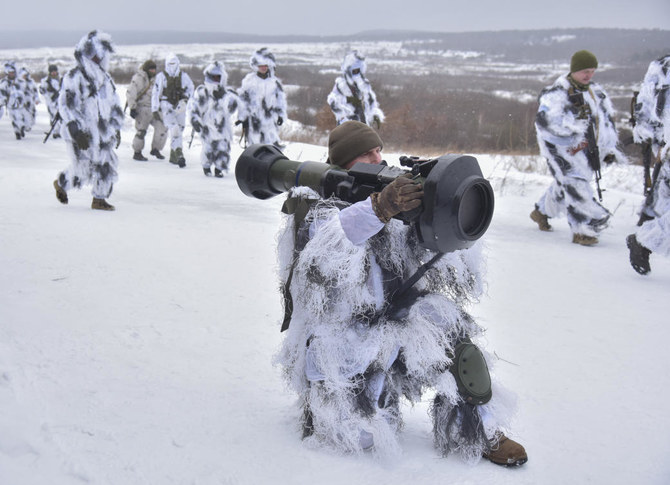
- US President Joe Biden warned Ukraine’s leader a day earlier that there is a “distinct possibility” that Russia could take military action
- “There won’t be a war as far as it depends on the Russian Federation, we don’t want a war,” Foreign Minister Sergey Lavrov said
US House quickly defeats Republican hardliners’ effort to oust Speaker Johnson
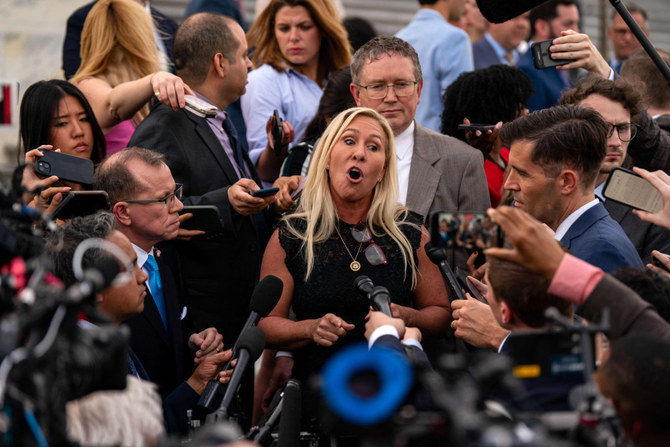
- Democrats joined Republicans in a 359-43 vote to protect Johnson’s speakership to avoid a replay of the chaos that occurred in October
- Hakeem Jeffries, the House's Democratic Party leader, said he hoped to see House Republicans turn against party hard-liners
WASHINGTON: The US House of Representatives on Wednesday swiftly and overwhelmingly defeated an effort by firebrand Republican Marjorie Taylor Greene to remove Speaker Mike Johnson, a fellow Republican, from his leadership role.
Democrats joined Republicans in a 359-43 vote to protect Johnson’s speakership, in a bid to avoid a replay of the chaos that occurred in October when Republicans ousted his predecessor, Kevin McCarthy.
Greene’s move represented a rare Republican defiance of presidential candidate Donald Trump, who in a social media post following the House vote on Wednesday, said it was “not the time” for Republicans to try to push out their own speaker.
Greene’s measure, known as a motion to vacate, showcased the disorder that has marked Republicans’ slim 217-213 House majority, particularly since it had been clear that the effort would fail given Democrats’ opposition.
“I appreciate the show of confidence from my colleagues to defeat this misguided effort,” Johnson, 52, said following the vote. “Hopefully this is the end of the character assassination that has characterized the current Congress.”

Multiple Republicans criticized Greene’s move, including centrist Representative Marc Molinaro.
“This is not an individual who knows how to lead,” Molinaro said of Greene. “She’s not an individual who knows how to negotiate. And she certainly doesn’t seem to have any concern for the stability of the Congress or the people we represent.”
Greene stood flanked by fellow Republican Thomas Massie when she made her move against Johnson, criticizing him for a string of compromises with Democrats, who hold a majority in the Senate.
“Excuses like ‘this is just how you have to govern in divided government’ are pathetic, weak and unacceptable,” Greene said of Johnson. “Even with our razor-thin Republican majority we could have at least secured the border.”
Taunts and jeers
The chamber erupted in taunts and cheers at points as Greene read her resolution, with Democrats at times chanting “Hakeem, Hakeem,” a reference to their party leader, Hakeem Jeffries, in an echo of the many times they voted for him as speaker during Republicans’ multiple rounds of voting for speaker since the current House was seated in January 2021.
Johnson has angered many hard-liners by enacting bipartisan spending measures to avoid government shutdowns and aid US allies including Ukraine, without insisting on strict security measures for the US-Mexico border that Democrats reject.
The House Republicans’ border security bill had no chance of passing the Democratic-controlled Senate.

A bipartisan compromise bill negotiated late last year and early this year in the Senate, with the Biden administration’s approval, was killed by House and Senate Republicans at Trump’s behest.
Johnson could be seen walking around the House floor after Greene began her call on Wednesday for his ouster, with Republican supporters shaking his hand and patting him on the back.
“Republicans have to be fighting the Radical Left Democrats, and all the Damage they have done to our Country,” Trump said in his Wednesday post. “We’re not in a position of voting on a Motion to Vacate. At some point, we may very well be, but this is not the time.”
The situation has bolstered Jeffries, who agreed to save Johnson from ouster after freeing Congress from the road block of Republican infighting by delivering crucial Democratic support for must-pass bills.
Greene in remarks to reporters after the vote did not rule out trying to oust Johnson again.
For his part, Jeffries said he hoped to see House Republicans turn against party hard-liners, saying, “The only thing we ask of our House Republican colleagues is for traditional Republicans to further isolate the extreme MAGA Republican wing of the GOP, which has visited nothing but chaos and dysfunction on the American people.”
Britain and NATO allies must spend more, be tougher, UK’s Cameron to say
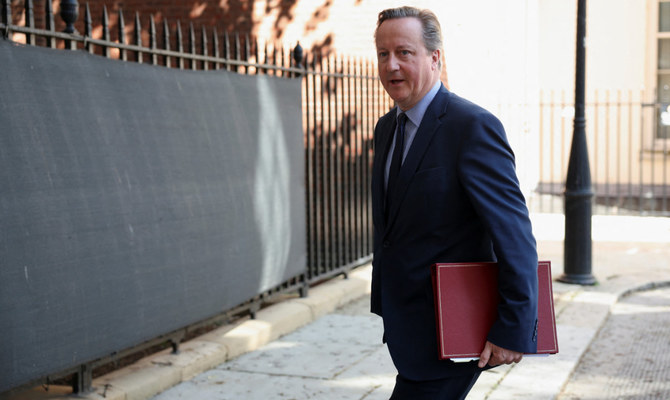
- The upcoming NATO summit must see all allies on track to deliver their pledge made in Wales in 2014 to spend 2 percent on defense
LONDON: Britain’s foreign minister, David Cameron, will urge its fellow NATO members to meet their pledge to spend 2 percent of GDP on defense, and to be tougher and more assertive with adversaries, in a speech to be delivered on Thursday.
In what is billed as his first major pronouncement as foreign secretary, Cameron will say NATO must “out-compete, out-cooperate and out-innovate,” and that Britain must not only bolster existing alliances but also forge new partnerships around the globe.
“We are in a battle of wills. We all must prove our adversaries wrong – Britain, and our allies and partners around the world,” Cameron will say at the UK’s National Cyber Security Center, according to extracts released by his office.
“The upcoming NATO summit must see all allies on track to deliver their pledge made in Wales in 2014 to spend 2 percent on defense. And we then need to move quickly to establish 2.5 percent as the new benchmark for all NATO allies.” Last month, Prime Minister Rishi Sunak said British defense spending would increase to 2.5 percent of GDP by 2030 — an additional 75 billion pounds ($94 billion) over the next six years.
Britain has been one of the most vocal and active backers of Ukraine in the wake of the invasion by Russia, and Cameron, a former prime minister, will say too nations are not learning the lessons of that conflict.
Some in Europe seem unwilling to spend on defense while war rages nearby, Cameron will say, adding that while some nations have criticized attacks on shipping in the Red Sea, only Britain and the United States have carried out strikes in retaliation.
“If (Russian President Vladimir) Putin’s illegal invasion teaches us anything, it must be that doing too little, too late only spurs an aggressor on,” he will say. .”.. This cannot go on. We need to be tougher and more assertive.”
Russia’s biggest airstrike in weeks piles pressure on Ukraine power grid
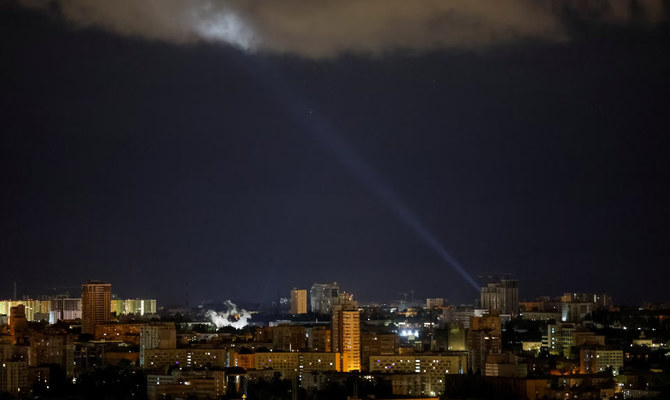
- Russia’s defense ministry said it struck Ukraine’s military-industrial complex and energy facilities in retaliation for Kyiv’s strikes on Russian energy facilities
KYIV: Russian missiles and drones struck nearly a dozen Ukrainian energy infrastructure facilities on Wednesday, causing serious damage at three Soviet-era thermal power plants and blackouts in multiple regions, officials said.
Ukraine’s air force said it shot down 39 of 55 missiles and 20 of 21 attack drones used for the attack, which piles more pressure on the energy system more than two years after Russia launched its full-scale invasion.
“Another massive attack on our energy industry!” Energy Minister German Galushchenko wrote on the Telegram app.
Two people were injured in the Kyiv region and one was hurt in the Kirovohrad region, Interior Minister Ihor Klymenko said.
Galushchenko said power generation and transmission facilities in the Poltava, Kirovohrad, Zaporizhzhia, Lviv, Ivano-Frankivsk and Vinnytsia regions were targeted.
Some 350 rescuers raced to minimize the damage to energy facilities, 30 homes, public transport vehicles, cars, and a fire station, the interior ministry said.
National power grid operator Ukrenergo said it was forced to introduce electricity cuts in nine regions for consumers and that it would expand them nationwide for businesses during peak evening hours until 11 p.m. (2000 GMT).
Ukrenergo CEO Volodymyr Kudrytskyi, interviewed by the Ukrainska Pravda media outlet, said electricity imports would not make up for power shortages. He said hydropower stations had also been hit, clarifying an earlier company statement omitting hydro stations from the list of affected facilities.
Power cuts for industrial users, he said, were “almost guaranteed” but interruptions for domestic users would depend on how well they reduced consumption.
“Many important power stations were damaged,” he said, citing three stations operated by DTEK, Ukraine’s biggest private company, as well as two hydropower stations.
“The damage is on quite a large scale. There is a significant loss of generating power, so significant that even imports of power from Europe will not cover the shortage that has been created in the energy system.”
Russia’s defense ministry said it struck Ukraine’s military-industrial complex and energy facilities in retaliation for Kyiv’s strikes on Russian energy facilities.
“As a result of the strike, Ukraine’s capabilities for the output of military products, as well as the transfer of Western weapons and military equipment to the line of contact, have been significantly reduced,” the ministry said.
WORLD WAR TWO ANNIVERSARY
President Volodymyr Zelensky noted the attacks were launched on the day Ukraine marks the end of World War Two.
“This is how the Kremlin marks the end of World War Two in Europe, with a massive strike, attempting to disrupt the lives of our people with its Nazism,” he said in his nightly video address.
In an earlier online address, Zelensky singled out what he said was the West’s limited progress in curbing Russian energy revenue and some countries that attended President Vladimir Putin’s inauguration for a fifth term in the Kremlin on Tuesday.
Fighting Nazism back then, he said, was “when humanity unites, opposes Hitler, instead of buying his oil and coming to his inauguration.”
Ukraine has stepped up drone attacks on Russian refineries this year despite apparent objections by the United States, trying to find a pressure point against the Kremlin whose forces are slowly advancing in the eastern Donbas region.
Ukrainian strikes on Russian refineries may have disrupted more than 15 percent of Russian oil refining capacity, a NATO military alliance official has said.
After pounding the energy system in the first winter of the war, Russia renewed its assault on the grid in March as Ukraine was running low on stocks of Western air defense missiles.
Prime Minister Denys Shmyhal estimated that more than 800 heating facilities had been damaged and up to 8 GW of power generation lost so far, adding the government needed $1 billion to fund repair work.
DTEK vowed to keep working to restore power at its facilities, and its CEO, Maxim Timchenko, called on Ukraine’s allies to provide more air defense systems.
Officials did not name the facilities hit on Wednesday, part of a policy of wartime secrecy that Kyiv says is needed to prevent Russia using the information for further strikes.
But Lviv governor Maksym Kozytskyi said Russia attacked a natural gas storage facility in his region in the west of the country, Radio Free Europe/Radio Liberty reported.
In central Poltava region, energy infrastructure was hit by a drone, Poltava Regional Governor Filip Pronin said.
The governors of Vinnytsia and Zaporizhzhia said critical civilian infrastructure facilities were damaged.
Armenia’s prime minister in Russia for talks amid strain in ties
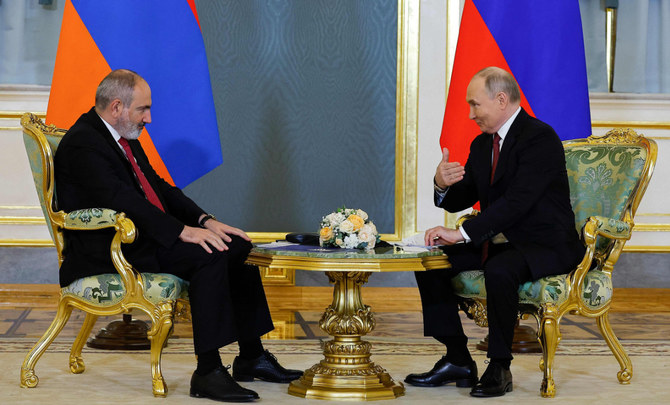
- Putin hosted Nikol Pashinyan for talks following a summit of the Eurasian Economic Union, a Moscow-dominated economic alliance
- Armenia’s ties with its longtime sponsor and ally Russia have grown increasingly strained after Azerbaijan waged a lightning military campaign in September to reclaim the Karabakh region
MOSCOW: Armenia’s prime minister visited Moscow and held talks Wednesday with Russian President Vladimir Putin amid spiraling tensions between the estranged allies.
Putin hosted Nikol Pashinyan for talks following a summit of the Eurasian Economic Union, a Moscow-dominated economic alliance. that they both attended earlier in the day. The negotiations came a day after Putin began his fifth term at a glittering Kremlin inauguration.
In brief remarks at the start of the talks, Putin said that bilateral trade was growing, but acknowledged “some issues concerning security in the region.”
Pashinyan, who last visited Moscow in December, said that “certain issues have piled up since then.”
Armenia’s ties with its longtime sponsor and ally Russia have grown increasingly strained after Azerbaijan waged a lightning military campaign in September to reclaim the Karabakh region, ending three decades of ethnic Armenian separatists’ rule there.
Armenian authorities accused Russian peacekeepers who were deployed to Nagorno-Karabakh after the previous round of hostilities in 2020 of failing to stop Azerbaijan’s onslaught. Moscow, which has a military base in Armenia, has rejected the accusations, arguing that its troops didn’t have a mandate to intervene.
The Kremlin, in turn, has been angered by Pashinyan’s efforts to deepen ties with the West and distance his country from Moscow-dominated security and economic alliances.
Just as Pashinyan was visiting Moscow on Wednesday, Armenia’s Foreign Ministry announced that the country will stop paying fees to the Collective Security Treaty Organization, a Russia-dominated security pact. Armenia has previously suspended its participation in the grouping as Pashinyan has sought to bolster ties with the European Union and NATO.
Russia was also vexed by Armenia’s decision to join the International Criminal Court, which last year indicted Putin for alleged war crimes connected to the Russian action in Ukraine.
Moscow, busy with the Ukrainian conflict that has dragged into a third year, has publicly voiced concern about Yerevan’s westward shift but sought to downplay the differences.
Kremlin spokesman Dmitry Peskov conceded Tuesday that “there are certain problems in our bilateral relations,” but added that “there is a political will to continue the dialogue.”
AstraZeneca to withdraw COVID vaccine globally as demand dips

- AstraZeneca says initiated worldwide withdrawal due to “surplus of available updated vaccines”
- Drugmaker has previously admitted vaccine causes side effects such as blood clots, low blood platelet counts
AstraZeneca said on Tuesday it had initiated the worldwide withdrawal of its COVID-19 vaccine due to a “surplus of available updated vaccines” since the pandemic.
The company also said it would proceed to withdraw the vaccine Vaxzevria’s marketing authorizations within Europe.
“As multiple, variant COVID-19 vaccines have since been developed there is a surplus of available updated vaccines,” the company said, adding that this had led to a decline in demand for Vaxzevria, which is no longer being manufactured or supplied.
According to media reports, the Anglo-Swedish drugmaker has previously admitted in court documents that the vaccine causes side-effects such as blood clots and low blood platelet counts.
The firm’s application to withdraw the vaccine was made on March 5 and came into effect on May 7, according to the Telegraph, which first reported the development.
The Serum Institute of India (SII), which produced AstraZeneca’s COVID-19 vaccine under the brand name Covishield, stopped manufacturing and supply of the doses since December 2021, an SII spokesperson said.
London-listed AstraZeneca began moving into respiratory syncytial virus vaccines and obesity drugs through several deals last year after a slowdown in growth as COVID-19 medicine sales declined.



